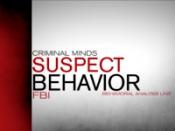Introduction
The Positivist School of Criminology rejected the Classical School's idea that all crime resulted from a choice that could potentially be made. Though they did not disagree with the Classical School that most crime could be explained through "human nature," they argued that the most serious crimes were committed by individuals who were "primitive" or "atavistic"--that is, who failed to evolve to a fully human and civilized state. Crime therefore resulted not from what criminals had in common with others in society, but from their distinctive physical or mental defects. The positivists understood themselves as scientists and were concerned with scientifically identifying the causes of criminal behavior in individual offenders.
Biological Factors in Crime
Not many want to believe there is any such thing as a "bad seed;" that heredity can make criminal behavior unavoidable and inevitable for some individuals. Of course, bio-psychologists do not believe that genetic or physiological components are the sole causal agents in behavior.
In the past, theories of the biological aspects of criminal behavior were marked by a general lack of knowledge regarding the human brain and by serious methodological shortcomings. More recently, biological aspects of criminal behavior have been investigated by numerous behavioral scientists. Scientists in such fields as genetics, biochemistry, endocrinology, neuroÃÂscience, immunology, and psychophysiology have been intensively studying aspects of human behavior that are relevant to the criminologist.
Psychological theories of crime begin with the view that individual differences in behavior may make some people more predisposed to committing criminal acts. These differences may arise from personality characteristics, biological factors, or social interactions.
Early Theories
According to Sigmund Freud (1856-1939), who is credited with the development of psychoanalytic theory, all humans have natural drives and urges repressed in the unconscious (Seigel, 2003). Furthermore, all humans have criminal tendencies. Through the process...


